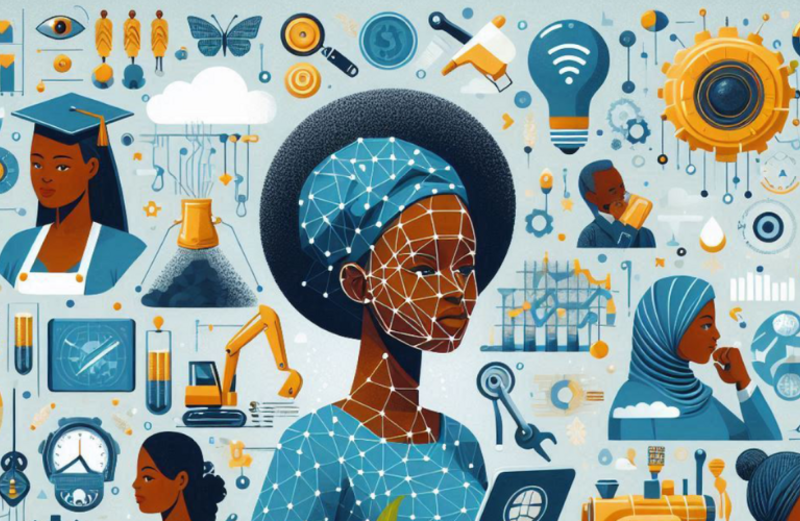AI And The Future Of Work In Africa: How AI Is Redefining Opportunities

This is the 11th post in a blog series to be published in 2024 by the APET Secretariat on behalf of the AU High-Level Panel on Emerging Technologies (APET)
Imagine a farmer in rural Kenya using an AI-powered tool to predict weather patterns, optimise planting schedules, and increase crop yields. Or picture an expectant mom in Limpopo, South Africa, receiving regular health promotion messages from a digital health application in her mother tongue, Xitsonga, providing her with crucial information about prenatal care. This isn't a distant future, it's happening now. AI is already transforming lives across Africa, from agriculture to healthcare, and its potential to reshape the future of work is immense.
To explore the transformative power of AI, the AI and the Future of Work in Africa White Paper provides a comprehensive analysis of its impact on the continent's job market. This white paper, developed by a cross-organisational team including the Africa Union High-Level Panel on Emerging Technologies (APET) Secretariat from AUDA-NEPAD, Microsoft Research, Microsoft Philanthropies, University of Pretoria, Lelapa AI, and Oxford University, focuses on four key themes: Macro-economic Impacts, Jobs, Skills, and Labour Markets, Workers’ Perspectives, and Africa-Centric AI Platforms. Each theme offers actionable insights and recommendations for leveraging AI to drive socio-economic growth and enhance the quality of work for all Africans.
Key Themes from the White Paper
- Macro-economic Impacts
In this theme, the white paper explores the macro-economic effects of AI, highlighting its potential to drive productivity growth, labour market changes, and industrial concentration. AI can significantly boost productivity across various sectors, such as agriculture, healthcare, and manufacturing. However, realising these benefits requires sound policies and substantial investments in digital infrastructure and human capital. The white paper emphasises that proactive measures must be taken to ensure AI development is inclusive and tailored to Africa’s unique needs.
Did You Know? It is estimated that in South Africa alone productivity increase from Generative AI could account for 0.5% of the GDP growth due to automation.
- Jobs, Skills, and Labour Markets
AI presents both opportunities and challenges for Africa’s labour markets. On the one hand, AI can create new job opportunities, enhance skills, and drive innovation. On the other hand, there is a risk of job displacement, particularly in sectors heavily reliant on routine tasks. The white paper highlights the importance of reskilling and upskilling the workforce to prepare for AI-driven changes. It calls for governments, educational institutions, and businesses to collaborate on developing robust training programmes that equip workers with the necessary skills to thrive in an AI-driven economy.
Did You Know? Only half of African countries have computer skills in their school curriculum, compared to a global average of 85%.
- Workers’ Perspectives
Understanding how AI affects workers is crucial. The white paper includes insights from diverse workers, exploring the cultural and social alignment of AI with African perspectives. It underscores the importance of developing AI that respects African languages, contexts, and data sovereignty. For instance, AI tools that understand and support local languages and cultural nuances can be far more effective in African settings. This section of the white paper stresses that the development of AI should prioritise the needs and well-being of African workers, ensuring that technology enhances rather than diminishes their quality of life.
Did You Know? African workers are highly diverse, from urban to rural, frontline to information workers, start-ups to enterprises, and with up to 85% working in the informal sector.
- Africa-Centric AI Platforms
The emergence of Africa-centric AI platforms is vital for addressing unique socio-economic challenges. The white paper discusses the importance of creating AI solutions tailored to the continent’s needs and ensuring inclusive design, ethical development, and robust regulatory oversight. By focusing on Africa-centric AI, the continent can develop solutions that are not only technologically advanced but also socially and culturally relevant. This approach can help bridge the digital divide and ensure that the benefits of AI are widely shared across different communities.
Did You Know? Generative AI can facilitate the development of locally relevant content by enabling the creation of customised solutions for specific challenges faced by African societies, including healthcare, agriculture, finance, disaster management, and education.
Personal Reflections from the White Paper Authors
Here are some insightful reflections from the contributors of the AI and the Future of Work in Africa White Paper:
Prof Vukosi Marivate, the ABSA UP Chair of Data Science and Associate Professor of Computer Science at the University of Pretoria, reflects on the journey: "There is still much to do regarding AI on the African continent. This whitepaper and other recent reports have shown that much is going on, and the continent is both actioning and thinking about how AI can be an enabler to improving the lives of all while at the same time protecting the citizens of the continent from possible negative effects of AI."
Mr Joseph Berkoh, Founder and Innovation Lead at Fixxies Technologies, joined the writing cohort with two critical questions: “What are the thoughts and concerns of multinational tech corporations on AI in Africa?; How open are they to involving indigenous stakeholders in discussing the future of their work on AI in Africa? AI and the Future of Work in Africa provides abstracts on the opportunities and risks of adopting and regulating generative AI, in the diverse faculties of Africa’s macro-economies, while securing the socio-economic development of Africa at its core. The two things I admire about this writing are:
- Africans curating their own narratives, in the global storytelling of digitalisation.
- The agile skills employed by the writing team to produce a timely and comprehensive document."
Ms Charlette N’Guessan, Africa-Centric Responsible AI Advocate at Afrokwary, found great value in collaborating with diverse stakeholders: "Working with diverse stakeholders on this white paper, exploring generative AI's impact on Africa's future workforce was very valuable. While the technology's potential is undeniable, concerns exist. Most generative AI models are sourced from the English-speaking Global North and may not accurately represent African realities. The white paper addressed this by exploring AI's impact on African economies, job creation, skill development, worker perspectives, and the critical need for Africa-centric AI platforms. Additionally, we have proposed some recommendations to navigate these areas effectively and ensure that Africa can leverage generative AI responsibly to create a future of work that benefits all."
Barbara Glover, from the African Union Development Agency-NEPAD (AUDA-NEPAD), shares her experience: "Being part of the team that developed the AI and the Future of Work in Africa White Paper has been an enlightening journey. This project underscored the importance of contextualizing AI within the unique socio-economic fabric of Africa. One of the key insights I gained is the critical need for Africa-centric AI solutions that not only address local challenges but also empower local communities. The white paper's emphasis on inclusive AI policies and the development of digital infrastructure aligns perfectly with our goal at AUDA-NEPAD to foster a technology-driven, sustainable future for the continent. I am particularly passionate about the potential of AI to bridge gaps in education and healthcare, offering tailored solutions that respect and enhance our diverse cultures and languages. As we move forward, it is imperative that we continue to advocate for responsible AI adoption, ensuring that the benefits of these technologies are accessible to all Africans, thus paving the way for a future where technology and humanity coexist harmoniously."
Click here to download your FREE white paper copy!
Potential Future Scenarios
Developing AI platforms rooted in the African context is essential, but how do we navigate potential future scenarios? The white paper presents two possibilities: a utopian future where AI drives equitable and sustainable growth, empowering a skilled workforce through investments in education and digital infrastructure, and acting as an equaliser in healthcare, education, and economic opportunities. Conversely, a dystopian future sees AI exacerbating inequalities, benefiting only a select few, increasing unemployment, and widening the digital divide. To achieve a utopian future, the white paper emphasises collaborative efforts between governments, businesses, and educational institutions to invest in digital infrastructure and human capital, promote inclusive AI policies, and foster an environment of innovation, ethical practices, and continuous learning.
In conclusion, the AI and the Future of Work in Africa White Paper provides a roadmap for harnessing AI to create a dignified and prosperous future of work on the continent. But this vision requires collective effort. Governments, businesses, and individuals must collaborate to ensure that AI development is inclusive, ethical, and aligned with Africa’s unique needs.
Let’s work together to shape a future where AI empowers every African worker. Download the full white paper, join our upcoming webinars, and participate in discussions. Follow us on LinkedIn and Twitter/X to stay updated and make your voice heard. Together, we can create a future of work that benefits all.
Featured Bloggers:
Barbara Glover – AUDA-NEPAD
Justina Dugbazah – The Sahara Institute
Bhekani Mbuli – University of Johannesburg
Chifundo Kungade – AUDA-NEPAD
Nhlawulo Shikwambane – AUDA-NEPAD
Maria Stella Namyalo – AUDA-NEPAD

